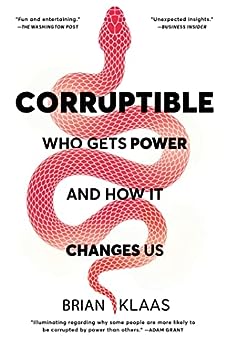How people choose to wield their power affects our daily lives, whether it’s a dictator or simply an obnoxiously officious member of a homeowner’s association. Brian Klaas, a political scientist and author of “Corruptible: Who Gets Power and How it Changes Us,” joins Big Think to talk about the nature of power, the people who are drawn to it, and the ways we can improve how power is wielded within institutions.
So, what’s one way to ensure that reasonable people rise to positions of power? Klaas proposes the strategy of asking politicians a fairly straightforward question before they take office: What would it take for you to think that you are no longer necessary in power? Answers to questions like these can reveal deep insights into what kind of a leader a person is likely to be.
An intro to power
0:00 Meet Brian Klaas
0:21 Why is it important to understand power?
1:55 Why did you start studying power?
3:12 Who is Lord Acton and how does he relate to power?
5:43 What are your 4 main arguments about power?
Who gains power and why?
6:18 Why do bad people often end up in positions of power?
11:12 Should we only give power to those who don’t seek it?
14:04 What is self-selection bias?
15:21 What is survivorship bias?
18:12 Does evolution play a role in survivorship bias?
Psychopathy and the ‘dark triad’
20:43 Why are we drawn to bad leaders?
25:23 Why do certain demographic groups often end up in power?
33:51 How can physical appearance affect our preference for leaders?
38:53 Who is Steve Raucci and what are the dark triad traits?
53:20 Can psychopathy ever be a beneficial trait?
55:04 Why might some psychopathy be beneficial to leaders?
58:32 Do the dark triad traits always occur together in individuals?
1:02:02 How common are the dark triad traits amongst dictators?
Stopping the “worst person in the world”
1:05:52 How can systems help us select better leaders?
1:10:34 Why are systems so important when it comes to power?
1:14:43 What real-world systems have you observed to learn about power?
1:19:02 Why does society often fail to screen out bad leaders?
1:21:18 How can we rethink democracy to help us choose better leaders?
1:27:17 Does policing attract people who are more likely to abuse power?
1:33:35 How do you believe we can improve policing?
1:37:12 How can thought experiments help us evaluate the decisions of our leaders?
1:41:30 Who is Abhisit Vejjajiva and what do his decisions teach us about power?
1:49:33 How can being thrust into power affect our decision-making?
1:53:45 How can we evaluate the decisions of individuals in power?

About Brian Klaas:
Associate Professor of Global Politics at University College London, Contributing Writer for The Atlantic, author of Corruptible: Who Gets Power and How It Changes Us, and Creator/Host of the award-winning Power Corrupts podcast.

Coach J.P. Money is the founder of Coach J.P. Money. He is an expert in Coaching and Money! He is also a writer, global citizen eco-activist, visionary, musician, artist, entertainer, businessman, investor, life coach, and syndicated columnist. He is also known as the music artist “Johnny Punish”; a name given to him by a bandmate during his Punk Rock years fronting the rogue underground punk band “Twisted Nixon”
His Expat home base since the late 1990s is Mexico. J.P. Money, aka Charles Bivona Jr., was educated at the University of Nevada Las Vegas (1980-81) and California State University Fullerton (1981-1984) with studies in accounting, finance and business. He bought is first real estate income property at 17 years old with no money down. He has been debt-free and building wealth since 1998.
Before the “internets” had been invented, he also owned and ran (5) national newspapers in the United States of America from 1987-1998. In addition, he created and ran the important online media sites; HireVeterans.com (2004-2020) and VT Foreign Policy (2004-2023).
J.P. Money is married to Queen Albertina from Sinaloa Mexico (1985). Together they have 3 adult children and 7 grandkids. They live in Baja Mexico at the home they built together out of plastic bags and dirt (Super Adobe). Now they share their epic artistic piece with the world as a unique luxury BnB called “Hacienda Eco-Domes“.
Read J.P. Money’s Full Bio at PunishStudios.com >>>













While I agree with most of what Mr. Klass said, I believe that he missed the most potent and practical way to deal with the problem of Narcissistic/Machiavellian/Psychopathic people rising to positions of power. Decentralizing power will blunt the bad effects of such people getting into power, and Mr. Klass would have to agree that despite our best screening efforts, those dark triad people will find ways to sneak past those hurdles. The Internet Age makes it possible to do away with large bureaucratic institutions in favor of smaller local ones.By decentralizing power we can have just as good of a life, but the little Napoleaons won’t go without a fight. We have to insist on decentralization and make it happen. Local institutions by their very nature have more scrutiny and vetting, and bad apples find it harder to hide.
Comments are closed.